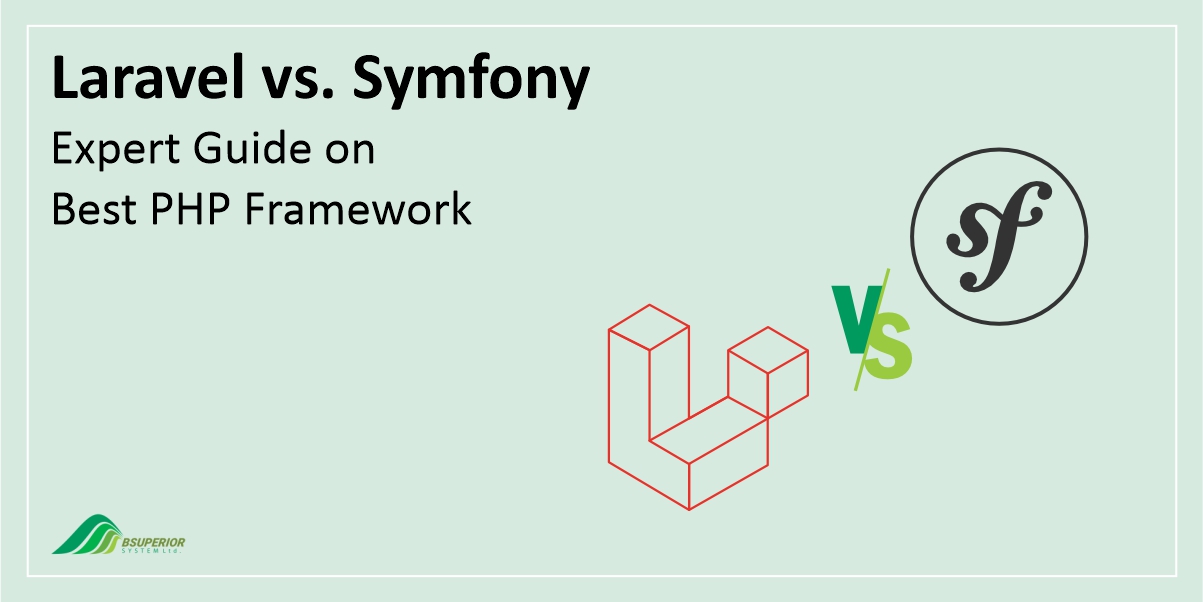Laravel vs. Symfony: Expert Guide on Best PHP Framework

Table Of Content
- What is Laravel?
- What is Symfony?
- Symfony vs. Laravel at a Glance
- Laravel vs. Symfony: Features
- Laravel vs. Symfony: Performance
- Laravel vs. Symfony: Modularity and Scalability
- Laravel vs. Symfony: Security
- Laravel vs. Symfony: Unit Testing
- Laravel vs. Symfony: Maintenance
- Laravel vs. Symfony: Differences and Similarities
- Summary
- FAQs
It goes without saying that building a website or web application from scratch without making use of any framework requires a great deal of time and effort. In the realm of PHP development, two frameworks stand out: Laravel and Symfony. In what follows, we will discuss the similarities and differences between Laravel vs. Symfony to help you decide which one suits you better.
What is Laravel?
Laravel is a popular PHP framework for web applications known for its elegant and creative syntax. It follows the MVC architecture and stands out for its simplicity and rapid development approach.
By incorporating the latest features from various frameworks, Laravel offers a comprehensive toolkit for building web applications. If you already have experience with PHP, learning Laravel is relatively easy.
Read More: DJANGO VS. LARAVEL: WHICH ONE IS BETTER?
Pros
- It stays up-to-date with the latest PHP features.
- It offers seamless integration with third-party platforms.
- It has a vast ecosystem of supplementary tools.
Cons
- Some Laravel applications may have heavier file sizes which can result in slower loading times on mobile devices.
- Updating Laravel to a newer version may potentially cause compatibility issues.
What is Symfony?
Symfony, an open-source framework, follows the MVC architecture and is favored by developers working on scalable web applications.
It integrates reusable components and independent PHP libraries, allowing developers to accomplish routine tasks without extensive PHP coding. Symfony’s code reusability makes it a great choice for complex projects.
Pros
- It has one of the largest communities of developers in the market.
- Symfony is regularly updated to meet the evolving needs of web developers.
- Many well-known platforms, such as Drupal, Magento, and eZ Publish, use Symfony.
Cons
- Learning Symfony might be more challenging compared to other PHP frameworks.
- It relies on other technologies, which can lead to slower application loading times and a lack of original components.
- Given the need for prebuilt code and extensive testing for multiple use cases, the development process in Symfony might be slower.
Symfony vs. Laravel at a Glance
Laravel and Symfony are two of the most popular PHP frameworks that are rich in features. Below is a comparison of these two frameworks.
| Aspect | Laravel | Symfony |
|---|---|---|
| Performance | Loading time is 60ms on average, suitable for projects with tight timelines. | Longer loading time at 250ms; requires more developmental effort and time. |
| Modularity and Scalability | Uses MVC-based apps with pre-built dependencies, making it user-friendly. | Uses reusable components, ensuring robust modularity and better code organization. |
| Security | Powerful security system with complex configuration. | Fairly easy security system with effective basic features. |
| Unit Testing | Provides unit testing tools to run multiple tests simultaneously. | Uses PHPUnit library for unit testing |
| Maintenance | More challenging maintenance framework | Easier to maintain |
Laravel vs. Symfony: Features
Both these PHP frameworks have well-defined features that enable developers to write less code with fewer potential errors.
Symfony Features
Symfony provides developers with a wide range of features. These features are explained below.
- Faster Development with Structured MVC: Symfony’s adoption of the Model-View-Controller (MVC) architecture enables efficient development of scalable and systematic web applications.
- Effective Profiler: Symfony includes a profiler designed to monitor application behavior, making application maintenance less daunting for web developers.
- Great Reliability: Symfony is considered the most reliable among alternative frameworks, and thus it is a preferred choice for building high-performance applications.
- High-Quality Documentation: Symfony distinguishes itself from many PHP frameworks by providing comprehensive and developer-friendly documentation.
- Impressive Extensibility: Symfony promotes code reusability through the use of bundles. Developers can reuse bundles without the need to modify the framework itself.
- Extensive Customizability: Symfony offers various customizable features that developers can tailor to their specific project needs.
- Effective Debugging: Symfony includes an extensible and effective debugging toolbar that simplifies the debugging process.
Large Community and High-Quality Support: Symfony is extensively tested and regularly updated. The Symfony community consists of more than 2,000 contributors who actively build new components and provide valuable support to users.
Laravel Features
Laravel offers several functional features, including built-in authentication and MVC support. Below are the main features of Laravel.
- Rapid Authentication: Laravel offers a quick and straightforward authentication process, which is vital for any web application. It includes a native authentication system that enables developers to set up models and controllers seamlessly.
- ORM for Database Interaction: Laravel incorporates a high-quality Object-Relational Mapping (ORM) feature that allows developers to interact with the database using simple PHP syntax instead of writing SQL code.
- Supporting MVC Architecture: With Laravel’s support for the MVC architecture, developers can create MVC-based applications.
- Artisan Command-Line Interface: Laravel offers the powerful Artisan command-line tool, which simplifies repetitive programming tasks.
Developers can use command lines to generate skeleton code, manage databases, and migrate data. Laravel also allows developers to create custom commands. - Effective Application Security: Laravel prioritizes application security and uses the Bcrypt Hashing Algorithm to implement robust security measures.
- Built-in Templating Engine: Laravel has lightweight templates that enable developers to create simple and complex layouts effortlessly.
- Comprehensive Unit Testing: Laravel excels in unit testing, providing developers with user-friendly tools to conduct thorough tests and quickly identify issues.
- Automatic Pagination: Laravel includes a built-in pagination feature that reduces the need for extensive code writing. It simplifies the process of displaying data in paginated formats, enhancing the overall user experience.
Laravel vs. Symfony: Performance
Symfony and Laravel are among the top choices for web development. Both frameworks offer speed, security, and convenience for quickly building web applications. However, there are differences in their performance.
Symfony Performance
Symfony websites take 250 milliseconds to load, which can impact page loading speed and overall website performance.
Laravel Performance
When it comes to performance, Laravel has an advantage over Symfony. The Laravel website loads in 60 milliseconds. This shows that Laravel has a faster performance than Symfony.
Which one wins?
In terms of performance, Laravel is a preferable option when comparing it to Symfony.
Laravel vs. Symfony: Modularity and Scalability
In terms of Modularity and Scalability, Symfony and Laravel have distinct characteristics.
Symfony Modularity and Scalability
Symfony offers more modularity compared to Laravel due to its reusable components. This means that Symfony allows developers to use pre-existing components and build applications by combining them in a modular fashion.
The modular architecture of Symfony enables developers to create complex and large-scale projects in a cleaner and more organized manner.
It provides the flexibility to enhance and scale complex web applications with relative ease. These features make Symfony a preferred choice for larger and more complicated projects.
Laravel Modularity and Scalability
Laravel is known for its suitability in MVC based web applications. While Laravel excels in this specific architectural pattern, it may not be as effective when deviating from the MVC paradigm.
However, Laravel offers a range of built-in features and a straightforward development process, making it an easy-to-use platform for web development projects. It is suitable for projects that prioritize fast development, performance, and ease of use.
Which one wins?
Symfony wins over Laravel development in this aspect. It provides more modularity due to its reusable components, and thus, it is an excellent choice for complex and large-scale projects.
Laravel vs. Symfony: Security
Symfony and Laravel have different approaches to security.
Symfony Security
Symfony provides a powerful security system, albeit with some complexity in its setup process. It offers a variety of authentication methods and a fine-grained permission mechanism that allows developers to implement robust security measure.Read More: IS LARAVEL GOOD FOR STARTUP? WHY IT IS THE BEST PHP FRAMEWORK FOR STARTUPS?
Laravel Security
Laravel, on the other hand, takes a simpler approach when dealing with security-related aspects of web applications. While it may not have the same level of complexity as Symfony, Laravel’s fundamental security features are generally more than sufficient for the majority of use cases.
Which one wins?
Symfony has the upper hand in terms of security as it provides more advanced security features.
Laravel vs. Symfony: Unit Testing
Both Symfony and Laravel equip developers with testing capabilities.
Symfony Unit Testing
Symfony offers web developers several advantages due to its reusable bundles, the absence of strict dependencies, and support for creating custom design patterns. These features make it easier for developers to maintain an app’s code and implement unit testing efficiently.
By using the PHPUnit independent library to automate unit testing, Symfony simplifies the testing process and reduces routine work for developers.
Laravel Unit Testing
Laravel also facilitates code testing with its provision of unit testing tools. It enables developers to run a large number of tests simultaneously, ensuring that the app’s code functions as intended and that any code changes won’t lead to system failures.
Which one wins?
Laravel wins out in unit testing since it provides a developer-friendly environment that enables web developers to conduct multiple tests and identify any flaws efficiently.
Laravel vs. Symfony: Maintenance
Symfony and Laravel, as two PHP frameworks, differ in terms of website maintenance.
Symfony Maintenance
Symfony excels in providing developers with an opportunity to enhance the functionality of web applications given that it is easier to maintain.
Laravel Maintenance
Unlike Symfony, Laravel’s maintenance framework is relatively more challenging, and thus it hinders developers from achieving the same level of efficiency in improving their web applications.
Which one wins?
Symfony outperforms Laravel when it comes to maintenance efficiency and effectiveness. If efficient site maintenance is your top priority, opting for Symfony would be a better choice.
Laravel vs. Symfony: Differences and Similarities
Laravel and Symfony are two frequently-used PHP frameworks that offer developers powerful features for building web applications. While both frameworks have similarities, they also have distinct differences that cater to various project requirements.
Similarities
The similarities between Symfony and Laravel stem from their shared foundation in PHP.
| Features | Symfony | Laravel |
|---|---|---|
| Programming Language | PHP | PHP |
| Platform Support | Cross-platform | Cross-platform |
| Design Pattern | MVC | MVC |
| Object-Relational Mapping | Yes | Yes |
| CLI Tools | Available | Available |
| Full Stack Capabilities | Yes | Yes |
| Internalization | Built-in features | Built-in features |
These frameworks share several features, including:
- Both employ PHP as their programming language.
- They are cross-platform, capable of running on multiple operating systems.
- Both frameworks support multiple users and are equipped to handle multi-language content.
- They provide application frameworks, interface design patterns, and support for text search functionality.
- They both support the MVC design pattern and object-relational mapping.
- CLI tools for common tasks and testing tools are readily available in both frameworks.
- Both Symfony and Laravel provide full-stack capabilities that run on multiple platforms.
- They incude built-in features for internationalization and extensibility.
- Both frameworks have developer support from extensive and active communities.
Differences
Despite sharing a number of features, these two frameworks have several key differences.
| Features | Symfony | Laravel |
|---|---|---|
| Framework Type | Collection of modular components | MVC Framework |
| Development Philosophy | Emphasis on flexibility and customization | Emphasis on simplicity and speed of development |
| Integration Level | Not fully integrated out of the box; requires selection and assembly of components | Fully integrated framework with pre-built components for common tasks |
Laravel is an MVC framework built on PHP, designed to simplify common tasks found in web applications, including authentication, routing, sessions, and caching.
Its purpose is to accelerate development and remove complexities. It aims to make the software development process enjoyable for developers while ensuring the application’s functionality.
On the other hand, Symfony is a collection of modular PHP components, a methodology, and collaborative communities dedicated to crafting web projects using PHP Symfony.
It differs from Laravel in that it is not a fully integrated MVC framework, offering a more flexible and modular approach to web development.
Summary
Laravel and Symfony are both popular frameworks that offer a wealth of features to manage the backend of your website or application. While Laravel prioritizes ease of use and speed, Symfony places flexibility as its primary strength.
There is no better or worse framework, and the choice between the two depends on the specific issues you need to address and which technology is most suitable for resolving them.
FAQs
There is no better or worse framework. Whether you choose Laravel or Symfony depends on the specific issues you want to address and which technology is most suitable for resolving them.
The actual performance of a Symfony-based application depends on how it is implemented and configured. If the application is created with numerous modules or features or lacks optimization for performance, it might show slower performance than expected.
Yes, Symfony is still being used as an application framework. It remains a popular choice for web development because of its wide usage and reliability.
In addition to Laravel and Symfony, there are some other PHP frameworks including Codeigniter, Phalcon, Slim, and CakePHP.
We value your input and believe this content may enhance our services. However, it's under review. If you see room for improvement, please use the "Report an issue" button below. Your feedback helps us excel.
Contact us today at –– and speak with our specialist.




